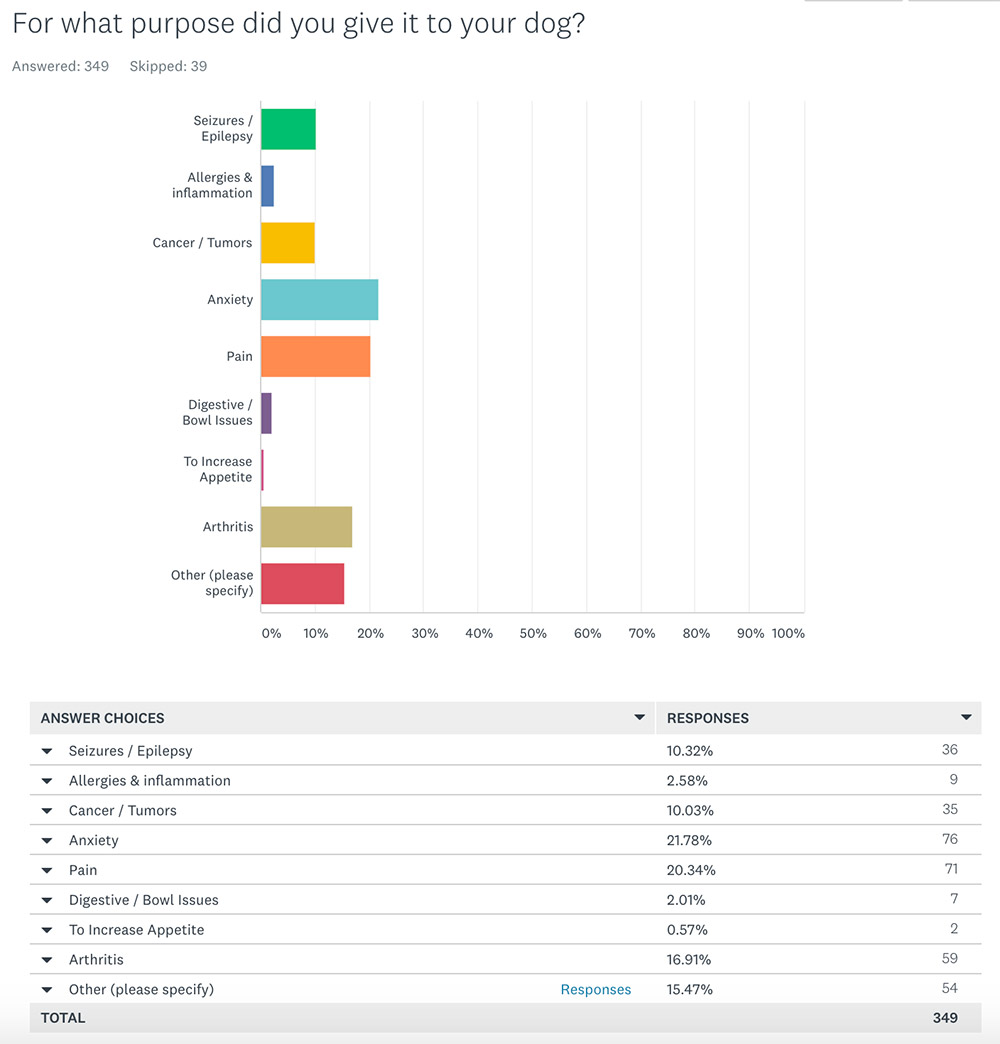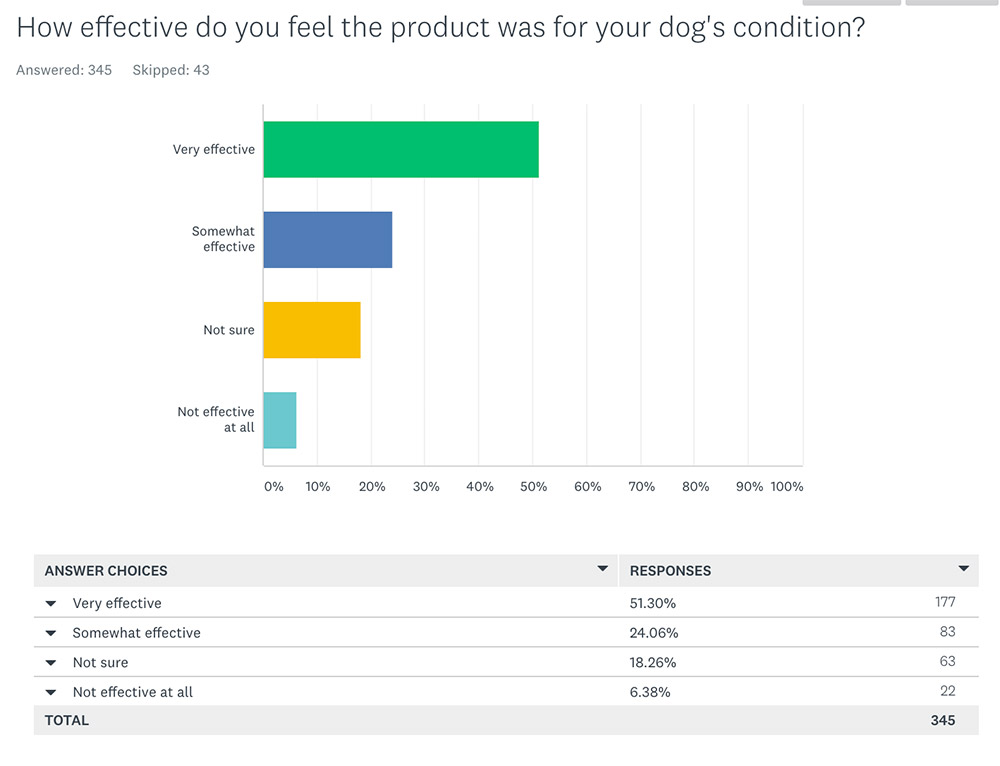

CBD (cannabidiol) for dogs has become one of the most talked about natural supplements in recent years. And while anecdotal success stories are abundant, what actual scientific studies have been done to confirm the safety and efficacy of CBD?
Much work has still to be done on CBD in both humans and animals, but the results we have so far are very promising. In this article, we’ll cover some of the more significant research in both dogs, people, and other animals.
Epilepsy in Dogs: 89% Reduction in Seizures
A group of researchers from Colorado State University are focusing on learning more about CBD oil as a viable treatment for epilepsy in dogs. For 24 weeks, dogs that experience at least two seizures a month will receive either CBD oil treatment or a placebo. Preliminary results released in July of 2018 have shown that a surprising 89% of the dogs studied showed a drop in regular seizures. The study is a double blind, placebo controlled test. 17
Dr. Stephanie McGrath is studying the impact of #CBD for dogs with epilepsy at our #csuvethospital.
Her clinical trials found that 89% of dogs in the treatment group had a reduction in the frequency of seizures. pic.twitter.com/iNueCEBJ0U
— CSU Vet Hospital (@CSUVetHospital) July 16, 2018
CSU Study on CBD for Safety & Delivery Method
In 2016, Colorado State University completed work on a pharmacokinetic & safety study of CBD in healthy dogs that was the first to demonstrate the compound was measurable in the blood. The study suggests that CBD usage in dogs is safe enough to warrant studies in a clinical population. 24
For the study, 30 healthy dogs were given 2 different dosages CBD in 3 different methods of delivery: capsules, oil tincture, and a cream applied on the skin. The results showed that CBD given orally in an oil tincture was most absorbed and bioavailable to the body. (This is why we always recommend buying CBD in a tincture instead of CBD treats).
Osteoarthritis in Dogs
Veterinary researchers from Colorado State University Teaching Hospital recently completed clinical trials testing the efficacy of CBD oil as a treatment for dogs suffering from osteoarthritis. All participating dogs showed visible lameness due to arthritis in one or more of their joints at the beginning of the trial. The study went on for 12 weeks, and results are currently pending.18
CBD for Inflammatory Bowel Syndrome
Multiple studies have shown promising results in alleviating symptoms of inflammatory bowel syndrome in humans. Other studies have suggested CBD can slow the course of the disease, improve symptoms, and increase the efficacy of available drugs for the treatment of disorders such as ulcerative colitis or Crohn’s disease. 22
CBD in Treatment-Resistant Epilepsy
Scientists surveyed a group of parents who were interested in sharing information about their children’s experiences with treatment-resistant epilepsy. Nineteen individuals who used cannabidiol-enriched cannabis to treat their children participated. It was found that 84% of the children experienced fewer seizures after taking CBD.20
CBD Helps Mice With Acute Pancreatitis
Mice showed evidence that cannabidiol treatment successfully reduces enzyme activity within the pancreas organ tissue. CBD showed anti-inflammatory properties that lead to “improved pathological changes.”19
Generalized Social Anxiety Disorder
Researchers administered doses of either CBD oil or a placebo drug to people with generalized social anxiety disorder to determine possible anxiolytic properties of CBD. They measured cerebral blood flow before and after treatment and found CBD oil to be associated with decreased subjective anxiety.21
Self Reported Survey Results on CBD in Dogs: April 2018, 349 Respondents
In April of 2018, iHeartDogs conducted a self-reported survey to 349 respondents who reported to have given CBD to their dogs. The following survey results represents the reasons why CBD was given:

The next question addresses whether the respondents felt like CBD helped the condition for which it was given.

In summary, 75.3% of respondents reported that CBD was “Very effective” or “Somewhat effective” at helping their dog’s condition for which is was given.
In conclusion, both the scientific and anecdotal evidence suggests CBD may be a very promising tool in maintaing health and wellness in dogs. If you’d like to learn more about CBD, please visit the resources below.
Additional Resources
- CBD for Dogs Buyer’s Guide: Things To Know Before Purchasing
- The Ultimate Guide to CBD for Dogs
- How CBD May Help Your Dog’s Separation Anxiety
- How CBD May Help Your Dog’s Joint Pain
Citations
16. Westword: Colorado State University Leading the Way in Veterinary CBD Treatment17. Colorado State University Veterinary Teaching Hospital: Efficacy of Cannabidiol for the Treatment of Epilepsy in Dogs
18. Colorado State University Veterinary Teaching Hospital: Efficacy of Cannabidiol for the Treatment of Osteoarthritis in Dogs
19. National Center for Biotechnology Information: Anti-Inflammatory Role of Cannabidiol in Acute Pancreatitis in Mice
20. National Center for Biotechnology Information: Cannabidiol-Enriched Cannabis Use in Pediatric Treatment-Resistant Epilepsy
21. National Center for Biotechnology Information: Neural Basis of Anxiolytic Effects of CBD in Generalized Social Anxiety Disorder
22. Therapeutic Use of Cannabis in Inflammatory Bowel Disease
via Whisker Therapy